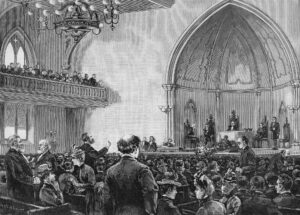In Christ Crucified: Understanding the Atonement, Donald Macleod provides a helpful and clear teaching on the atoning work of Christ. This book is clear, concise, and addresses and responds to the oppositions that the church is facing today regarding the atonement.
The following 15 quotes caught my attention, provided clarity in my understanding of Scripture’s teaching, and most importantly, stirred up affection of awe and worship of the triune God in my soul.
- “Love will not merely wash feet. It will lay its life down” (21).
- “[Jesus] loved and served to the end” (35).
- “The pain of the cross is the pain of the triune God” (50).
- “God requires the lamb; God provides it, and God offers it. But he provides it not from outside of himself, but from within; from within the offended deity. He spared not his own Son (Rom 8:32). The Son of God becomes the Lamb of God” (66).
- “Christ bears away the sin of the world by taking responsibility for it, suffering for it and, eventually, dying for it” (67)
- “The death of this one man [Jesus Christ] has universal and inclusive significance because in him the Creator acts and the Creator suffers” (79).
- “Christ does not merely offer the sacrifice; he becomes the sacrifice. He is not simply one who dies with the rest of us or pleads that we be spared the death sentence. He is the one who dies in order that we be spared this death. He drinks the cup so that we should not drink it; is cursed so that we should not be cursed; is forsaken so that we should not be forsaken; is condemned so that we should not be condemned” (85).
- “Christ did not sacrifice himself in order that his church become a quivering wreck. He died to make her glorious and radiant (Eph. 5:27). No man, then, can stand at the cross of Calvary and feel inspired to live as a selfish, domineering patriarch” (100).
- “Christ did not die merely to put preachers in a position where they could hopefully offer his salvation to all men. He died to ensure that an innumerable multitude would respond to that offer and enter into eternal life” (125).
- “Redemption from sin includes redemption from its power as well from its guilt, and if the death of Christ actually saves it must secure not only forgiveness but a change of heart” (126).
- “Unless our sins are remitted, God’s anger is inevitable, but before they can be remitted they must be expiated. Christ, by his blood, is that expiation, the place where sin is atoned for, and where God meets with us and speaks to us, justifying those who put their faith in Jesus Christ (Rom 3:26)” (147).
- “it is the offended, not the offender, who not only takes the first step [for reconciliation] but carries the whole process through to its conclusions” (154).
- “Reconciliation consists of God cancelling the debt [of sin]. It is not that he has nothing against us, but that he holds nothing against us. Reconciliation is a comprehensive act of forgiveness” (154).
- “He will bear the whole cost. He will provide the one who will take the sinner’s place. But he will go even further: he will become the one who takes the sinner’s place” (177).
- “Calvary speaks of the love of God only because it portrays him as not shrinking from that great costly act [the death of his son] by which alone the world could be redeemed” (196).
This book reminded me over and over, the depth and cost of my wretched and miserable sin which is infinite upon infinite. Yet, at the same time the length and depth and width and height that the triune God was willing to go. Indeed, “Neither death nor life, nor angels nor rulers, nor things present nor things to come, nor powers, nor height nor depth, nor anything else in all creation, will be able to separate us from the love of God in Christ Jesus our Lord” (Rom. 8:38).
























